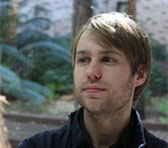20 March 2014
Teaching and learning composition: the trick of finding your way
 Image: Christopher Healey
Image: Christopher Healey In 2013 I had the opportunity, as part of an Honours thesis, to put a series of questions about teaching and learning composition to thirteen of Australia's finest composers (all Represented artists with the AMC). The responses showed some agreement about aspects of composing, but in many ways they simply represented a diversity of thinking and interacting with music. Where once there may have been a 'right' way to learn to be a composer, today there is ultimately only a 'your' way. The trick, of course, is finding your way to 'your way'.
The very first question I asked was whether or not composing
could be taught or learned. The answers could probably be summed
up as something like: 'Yes…well…no…well, maybe…depends on the
student.'
Talent has always been a tricky thing to discuss.
There is quite a lot of research on the topic of talent, and it
is mostly in favour of hard work and deliberate practice. After
all, the simple fact is that there has never been a person born
able to compose a good piece of music.
Where talent was mentioned by the composer, it was almost always in the context of whether or not the student has 'something to say'. Did the responses suggest that harmony, counterpoint, form, orchestration and all the other 'craft' elements of composing couldn't be taught or learned? No, only that it was impossible to teach a student what to do with that craft.
So why do some people seem to have 'something to say' and others
don't? Is it something you either have or do not?
As it turns out, many of these composers have actually developed
rituals that foster and support this aspect of their music
making. For example, some of them compose something new every day
('One cannot sit around waiting for "inspiration"'), some sketch
broad ideas on a blank sheet of paper, some improvise, some read
books and listen to music, and some just 'interrogate the
material' and metaphorically beat it into submission.
Of course, having something to say is only one aspect of
composing. Just as with playing a musical instrument, composing
requires a wide variety of skills and knowledge to produce a
satisfying musical experience.
One of the comments provides a good reference point for aspiring
composers to aim for in terms of their knowledge and craft: 'When
ideas seem to flow easily from the score, through the performers
to the audience, then this is virtuosity - even if the music
itself is comparatively simple (on any analytical axis).'
But what are all the different skills that come together to
create this compositional virtuosity? I asked the composers to
describe the ideal form of an education in composition. The
responses indicated that there are six key focal areas of a good
composition education:
1. Cultural, historical and general knowledge
2. Developing uniqueness
3. Engagement with technology
4. Experiencing music-making
5. Technical mastery
6. Learning interactively
I broke down these areas into possible learning activities - if you're a teacher or student, you may be interested in this, so I've posted a table showing this on my blog.
Can anyone be a composer? This is a tough question to answer. Based on my research and composers' responses, it seems that everyone probably has the potential for it, but not very many people will have the patience and work ethic to keep pushing themselves to get better, especially as the return for time invested begins to taper off in later development.
There are, of course, more factors that come into play than simply composing ability. In an ideal world, a bright star would mark the birth of a masterpiece, and people would embark on long voyages to see/hear it for themselves. In reality, there is probably a lot of great music by more bashful composers that has never been heard.
For those who may aspire to be a composer, I'll leave you with some advice from researchers on expertise, Ericsson and Charness: 'Expert musicians in their study spent approximately four hours a day - every day including weekends - on deliberate practice. Practice sessions were approximately one hour long, followed by a period of rest.'1
Footnote
1. Ericsson, K. Anders, and Neil Charness. 'Expert Performance: Its Structure And Acquisition.' American Psychologist 49.8 (1994): 725-747.
© Australian Music Centre (2014) — Permission must be obtained from the AMC if you wish to reproduce this article either online or in print.
Christopher Healey is a young Australian composer residing in Brisbane. His composition teachers have included Gerard Brophy and now Robert Davidson. He is currently completing the Honours year of his Bachelor of Music at the University of Queensland.
Comments
Be the first to share add your thoughts and opinions in response to this article.
You must login to post a comment.